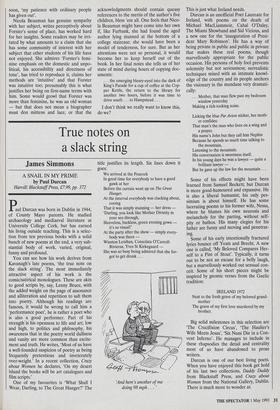True notes on a slack string
James Simmons
A SNAIL IN MY PRIME by Paul Durcan Blackstaff Press, fZ99, pp. 372 Paul Durcan was born in Dublin in 1944, of County Mayo parents. He studied archaeology and mediaeval literature at University College Cork, but has earned his living outside teaching. This is a selec- tion from ten previous books with a solid bunch of new poems at the end, a very sub- stantial body of work, varied, original, funny and profound.
You can see how his work derives from Kavanagh's late poems, `the true note on the slack string'. The most immediately attractive aspect of his work is the comic/satirical monologues. These are akin to good scripts by, say, Lenny Bruce, with the added weight on the page of assonance and alliteration and repetition to salt them into poetry. Although his readings are famous, it would be wrong to call him a `performance poet', he is rather a poet who is also a good performer. Part of his strength-is his openness to life and art, low and high, to politics and philosophy, his awareness that in the poetry world dullness and vanity are more common than excite- ment and truth. He writes, `Most of us have a well-founded suspicion of poetry as being frequently pretentious and inveterately over-weight.' In a recent collection, Crazy about Women he declares, 'On my desert island the books will be art catalogues and film scripts.'
One of my favourites is `What Shall I Wear, Darling, to The Great Hunger?' The title justifies its length. Six lines down it goes:
We arrived at the Peacock In good time for everybody to have a good gawk at her Before the curtain went up on The Great Hunger.
At the interval everybody was clucking about, cooing That it was simply stunning — her dress — `Darling, you look like Mother Divinity in your see-through, Sleeveless, backless, green evening gown it's so visual!'
At the party after the show — simply every- body was there - Winston Lenihan, Consolata O'Carroll- Rivieras, Yves St Kirkegaard - She was so busy being admired that she for- got to get drunk ...
And here's another of me doing 98 mph . . . ' This is just what Ireland needs.
Durcan is an unofficial Poet Laureate for Ireland, with poems on the death of Michael MacLiammoir, Cahal O'Daley, The Miami Showband and Sid Vicious, and a new one for the `inauguration of Presi- dent Mary Robinson'. He has a way of being private in public and public in private that makes these real poems, though marvellously appropriate for the public occasion. His persona of holy fool prevents solemnity but not seriousness; surrealistic techniques mixed with an intimate knowl- edge of the country and its people anchors the visionary in the mundane very dramati- cally: ... Mother, that man flew past my bedroom window yesterday
Making a tick-tocking noise.
Licking the blue Par Avion sticker, her moth- er confides: That man's the man who lives on a wing and a prayer. His name's John but they call him Nephin Because he spends so much time talking to the mountain, Listening to the mountain.
His conversation is sweetness itself.
In his young days he was a lawyer — quite a brilliant lawyer - But he gave up the law for the mountain ...
Some of his effects might have been learned from Samuel Beckett; but Durcan is more good-humoured and expansive. He is also a liberal humanist; his only pes- simism is about himself. He has some lacerating poems to his former wife, Nessa, where he blames his own neurosis and melancholy for the parting, without self- pity or bathos. His many elegies for his father are funny and moving and penetrat- ing. Some of his early intentionally fractured lyrics bounce off Yeats and Brecht. A new one is called, `My Beloved Compares Her- self to a Pint of Stout'. Typically, it turns out to be not an excuse for a belly laugh, but a marvellously worked out sensual con- ceit. Some of his short pieces might be inspired by gnomic verses from the Gaelic tradition:
IRELAND 1972 Next to the fresh grave of my beloved grand- mother The grave of my first love murdered by my brother.
Big solid milestones in this selection are `The Crucifixion Circus', `The Haulier's Wife Meets Jesus', `Six Nuns Die in a Con- vent Inferno'. He manages to include in these rhapsodies the detail and centrality most of us have abandoned to prose writers.
Durcan is one of our best living poets. When you have enjoyed this book get hold of his last two collections, Daddy Daddy from Blackstaff Press, and Crazy about Women from the National Gallery, Dublin. There is much more to wonder at.


























































 Previous page
Previous page